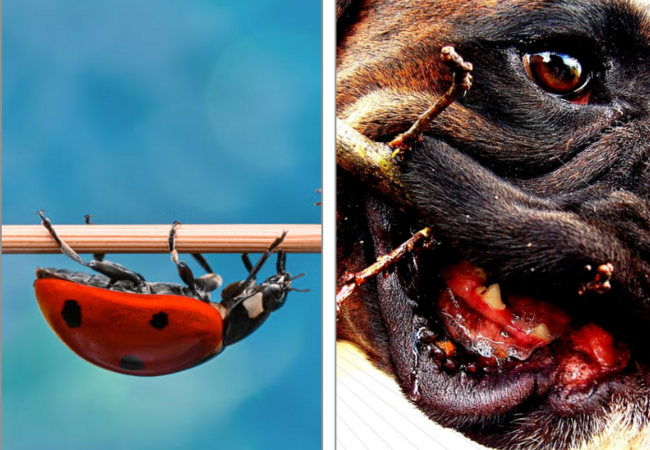Asian Lady Beetles & Dogs (2025): Vet-Approved Risks & Safety Tips 🐞🐾

In this article
Asian Lady Beetles & Your Dog: Risks, Treatment & Prevention in 2025 🐞🐾
By Dr Duncan Houston BVSc
1. Who Are Asian Lady Beetles?
Also known as multicolored Asian lady beetles, these invasive beetles often enter homes during cooler months. They’re not true ladybugs and are more aggressive.
2. Are They Toxic to Dogs?
While not poisonous like classic toxins, these beetles release hemolymph—a foul, chemical fluid—when squashed or in distress.
A documented dog consumed ~16 beetles, which lodged on the roof of its mouth and released hemolymph, causing chemical burns and a bad odor.
3. Symptoms to Watch For
- Foaming, drooling, bad breath, and mouth irritation
- Mild GI upset—vomiting, diarrhea
- Lethargy, reluctance to eat
- Behavioral changes due to mouth discomfort.
4. What to Do If Your Dog Eats Them
- Inspect your dog’s mouth; look for stuck beetles or sores.
- Gently rinse with clean water—do *not* attempt to crush more beetles.
- Call your veterinarian or poison hotline if symptoms appear.
- Vet may remove beetles, rinse, and monitor oral health.
5. Treatment & Recovery
Most dogs recover fully after removing beetles, with supportive care—like rinsing and mild pain relief—as needed.
6. Prevention Tips for 2025
- Seal cracks around windows and doors before beetle season.
- Use screens or door sweeps to block entry.
- Vacuum indoor beetles promptly to avoid pet contact.
- Distract dogs during mass “beetle swarms”—prevent mouth exploration.
7. When to Call Your Vet
Contact your vet if you see persistent drooling, mouth irritation, vomiting, diarrhea, or lethargy after suspected ingestion.
8. Ask A Vet Resources & Support
- 📱 Ask A Vet App – instant vet advice if beetle ingestion occurs.
- 🎓 Home Plant & Pest Safety Webinars – learn how to pet-proof your space from insects.
- 🛠️ Woopf & Purrz Safety Kits™ – seasonal tips for insect-proofing windows and doors.
9. Final Takeaway
Asian lady beetles aren’t venomous, but their defensive fluids can irritate dogs’ mouths and GI systems. Most cases resolve quickly, but check your dog's mouth, rinse gently, and seek vet care if any symptoms arise. Prevent entry in the first place with simple home measures for a worry-free season 🐶❤️.
Worried your dog ate these beetles? Visit AskAVet.com or open our app for fast, expert guidance.






